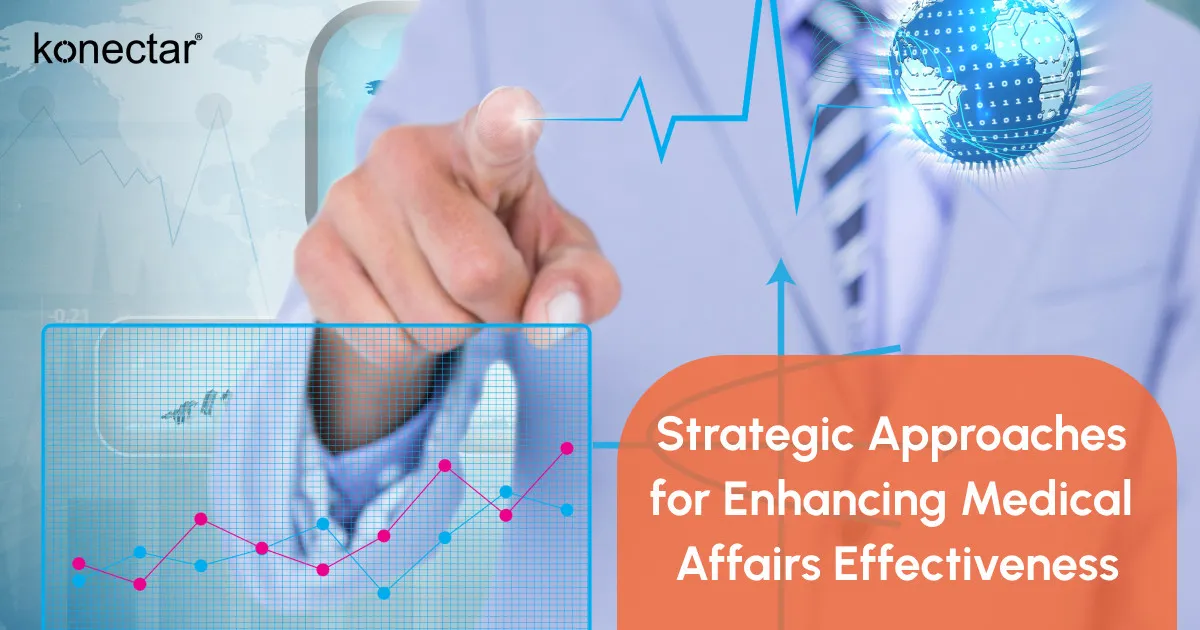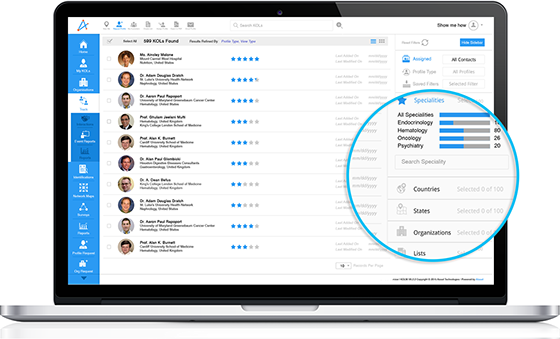24-07-2024
Strategic Approaches for Enhancing Medical Affairs Effectiveness

Medical Affairs landscape is undergoing a significant transformation! This transformation is driven by the advancement in medicinal science, and increasing availability and complexity of data. In such scenarios, data-driven insights are enabling medical affairs teams to enhance strategic HCP (Healthcare Professional) engagement, improve patient outcomes, and achieve organizational goals.
In this article:
Medical Affairs teams have been using traditional legacy processes and disconnected systems. The HCP engagement strategies were often based on static lists of top-tier physicians, which led to limited and sometimes ineffective outreach efforts. As the healthcare landscape evolved, the need for more dynamic and data-driven approaches became evident. Today's medical affairs teams must steer through an ever-expanding landscape of information, balance traditional expertise and connect with established as well as emerging key opinion leaders.
The Role of Data Analytics in Medical Affairs
Data analytics plays a pivotal role in modernizing Medical Affairs. By leveraging data-driven insights, teams can gain a better understanding of medical advancements and the overall healthcare marketplace. For instance, understanding the role and impact of scientific leaders and the acceptance of current standards of care by treatment experts requires a comprehensive analysis of existing data.
Data-driven insights help MSLs tailor their interactions with KOLs and HCPs based on specific needs and interests and align their activities with the company's strategic objectives and therapeutic goals.
Some sources of data and insights can be readily available to the teams but organizations need to consider external interactions as well such as virtual, in-person or digital, medical science literature, social media etc to gather insights for the potential opportunities.
This enhanced understanding allows medical affairs to align resources and efforts more effectively, which ultimately helps improve patient care and drive successful HCP engagement strategies.
Additionally, technology enables an automated search and quick analysis of structured and unstructured data. Many AI and NLP-based software have been developed to suit the unique requirements of the life sciences industry. This software provides accurate analysis of external publications, conference proceedings, social media listening, reports, and various other sources of unstructured data that were previously deemed to be too difficult to access and analyze.
One of the significant shifts in medical affairs is moving from traditional opinion leadership to a focus on expertise. This transition is crucial in bridging the gap between academic research and real-world clinical demands.
Identifying the Right Experts
Today, identifying the right experts doesn't merely involve targeting the top 100 physicians; it requires understanding each individual's influence within a broader network of healthcare professionals and patients at large. An analytics-based approach provides life sciences organizations with a smarter and more strategic assessment of the competitive landscape, which aligns with their specific organizational goals and objectives.
Implementing an AI-powered HCP Management platform can help life sciences teams gain a clearer picture and deep insights into physicians and many aspects of their professional activities. Data-driven solutions help medical affairs teams tailor their interactions and drive decision-making processes more effectively.
In this context, konectar, an AI-Powered platform is empowering the life sciences industry by seamlessly identifying KOLs (Key Opinion Leaders) and HCPs (Healthcare Professionals) through its advanced machine learning capabilities. By leveraging konectar’s data-driven insights, teams can efficiently collaborate with HCPs for various purposes, including clinical trials, speaking engagements, authorship, drug development, and patient advocacy.
The platform’s sophisticated algorithms analyze vast datasets to identify the most relevant physicians, while providing comprehensive profiles that include areas of expertise, past collaborations, and influence in the field. konectar’s customizable search allows users to tailor their criteria to find HCPs that best fit their specific needs and objectives. Additionally, its seamless integration with existing CRM systems streamlines workflows and enhances productivity.
Key Insights Strategies for Medical Affairs and Medical Science Liaison
To effectively handle insights-related activities in Medical Affairs, which are inherently complex and strategically valuable, life sciences teams can consider the following points:
- * Understand key customer perspectives and focus areas driven by factors such as:
- 1. Product life cycle stage
2. Key external events like registration or launch
3. Significant data disclosures
4. Environmental changes, such as new treatment guidelines or shifts in treatment paradigms
- *A crucial aspect of the insights process is fostering a closer connection and feedback loop between those interacting with customers and those setting strategies. This necessitates understanding the specific insights needed across the organization—from therapy areas, products, geographical regions, and functional perspectives—to generate actionable insights, share them effectively, and utilize them proactively.
- *Use available technology to collate, curate, analyze, and interpret the gathered information effectively.
- *Incorporate insights into ongoing operational and annual planning activities of product teams to ensure they inform strategic decisions and actions.
The Future of Medical Affairs
The future of medical affairs lies in embracing data-driven insights and leveraging advanced technologies like ML and NLP. As the volume of data continues to grow, medical affairs teams must be equipped to handle and interpret this information efficiently. The role of medical affairs is evolving to become the third strategic pillar in life sciences, alongside commercial and research and development (R&D). To fully realize this potential, investments in technology and training are essential.
Experience how konectar's AI-powered platform can enhance your data-driven insights. To gain a comprehensive view of HCPs, medical conference proceedings, social media listening, publication gaps, and more, request a demo of konectar today!
FAQs
- What is the role of data analytics in medical affairs?
Data analytics helps medical affairs teams understand the healthcare landscape, align resources effectively, and improve HCP engagement strategies and patient care.
- How does NLP benefit medical affairs?
NLP enables the extraction of meaningful insights from unstructured data, supports post-market surveillance, enriches structured data, and automates data extraction, enhancing decision-making and strategic engagement.
- Why is shifting from opinion leadership to expertise important in medical affairs?
This shift bridges the gap between academic research and real-world clinical demands, allowing medical affairs teams to identify the right experts and create more effective engagement strategies.
- How can medical affairs teams leverage data-driven solutions?
By using an effective HCP Management Platform that provides data-driven solutions in the form of brilliant insights on various aspects of the healthcare landscape, Medical Affairs teams can tailor their interactions with healthcare professionals, drive decision-making processes, and achieve better patient outcomes.





